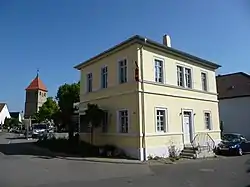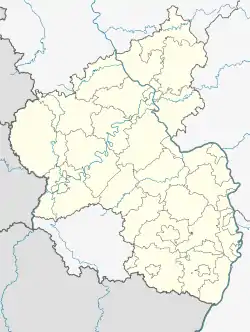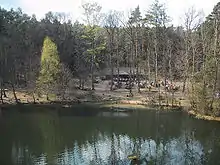Weisenheim am Berg
Weisenheim am Berg (Palatine German: Weisrem, or to distinguish it from Weisenheim am Sand, Weisemberg) is an Ortsgemeinde – a municipality belonging to a Verbandsgemeinde, a kind of collective municipality – in the Bad Dürkheim district in Rhineland-Palatinate, Germany.
Weisenheim am Berg | |
|---|---|
 Former school building by August von Voit | |
 Coat of arms | |
Location of Weisenheim am Berg within Bad Dürkheim district  | |
 Weisenheim am Berg  Weisenheim am Berg | |
| Coordinates: 49°30′43″N 08°09′01″E | |
| Country | Germany |
| State | Rhineland-Palatinate |
| District | Bad Dürkheim |
| Municipal assoc. | Freinsheim |
| Government | |
| • Mayor | Georg Blaul (CDU) |
| Area | |
| • Total | 9.21 km2 (3.56 sq mi) |
| Elevation | 230 m (750 ft) |
| Population (2019-12-31)[1] | |
| • Total | 1,699 |
| • Density | 180/km2 (480/sq mi) |
| Time zone | UTC+01:00 (CET) |
| • Summer (DST) | UTC+02:00 (CEST) |
| Postal codes | 67273 |
| Dialling codes | 06353 |
| Vehicle registration | DÜW |
| Website | www.weisenheim.de |
Geography
Location
The municipality lies on the edge of the Haardt range in the Palatinate. Woods cover 54.7% of the municipal area. Weisenheim am Berg belongs to the Verbandsgemeinde of Freinsheim, whose seat is in the like-named town.
Neighbouring municipalities
Clockwise from the north, these are Bobenheim am Berg, Herxheim am Berg, Leistadt and Altleiningen.
History
In 771, Weisenheim am Berg had its first documentary mention in the Lorsch codex.
Politics
Municipal council
The council is made up of 16 council members, who were elected at the municipal election held on 7 June 2009, and the honorary mayor as chairman.
The municipal election held on 7 June 2009 yielded the following results:[2]
| SPD | CDU | FDP | Total | |
| 2009 | 6 | 9 | 1 | 16 seats |
| 2004 | 6 | 9 | 1 | 16 seats |
Coat of arms
The German blazon reads: Von Silber und Schwarz geteilt, oben die miteinander verschlungenen schwarzen Großbuchstaben WAB, unten ein sechsstrahliger goldener Stern, beseitet von je einer silbernen Rose mit goldenem Butzen.
The municipality's arms might in English heraldic language be described thus: Per fess argent the letters W, A and B in fess ligatured sable, and sable a mullet Or between two roses of the first seeded of the third.
The arms go back to a village seal from 1764. The charges in the escutcheon's lower half are unclear. They could be a reference to the old local court.
The arms have been borne since 4 April 1984.[3]
 Coat of arms
Coat of arms "Banner" (vertical flag for hoisting from a horizontal pole)
"Banner" (vertical flag for hoisting from a horizontal pole)
Town partnerships
Weisenheim am Berg fosters partnerships with the following places:
 Plaus (Italian pronunciation: [ˈplaus]), South Tyrol, Italy
Plaus (Italian pronunciation: [ˈplaus]), South Tyrol, Italy Saint-Gengoux-le-National, Saône-et-Loire, France
Saint-Gengoux-le-National, Saône-et-Loire, France Niederdorla, Unstrut-Hainich-Kreis, Thuringia
Niederdorla, Unstrut-Hainich-Kreis, Thuringia
Culture and sightseeing

Natural monuments
The nearby Ungeheuersee reservoir, surrounded by mixed forest, is protected as a natural monument.
Regular events
- At the long weekend around Ascension Day, Weisenheim’s biggest regular event is held, the traditional Partnership, Wine and Homeland Festival.
- Each year on the next to last weekend in August, the Kerwe, a wine festival, is held.
- On the Sunday before Volkstrauertag, the Stutzenfest is held at which new citizens are initiated.
Economy and infrastructure
Transport
To the east runs Bundesstraße 271, which in the north leads to the Autobahn A 6. In Herxheim am Berg is a railway station on the Pfälzische Nordbahn. From Bad Dürkheim runs the Rhein-Haardtbahn to Ludwigshafen and Mannheim. Public transport is integrated into the VRN, whose fares therefore apply.
Education
Weisenheim has one kindergarten and one primary and regional school.
Famous people
Sons and daughters of the town
- Otto Georgens, auxiliary bishop in the Bishopric of Speyer
References
- "Bevölkerungsstand 2019, Kreise, Gemeinden, Verbandsgemeinden". Statistisches Landesamt Rheinland-Pfalz (in German). 2020.
- Kommunalwahl Rheinland-Pfalz 2009, Gemeinderat
- Description and explanation of Weisenheim am Berg's arms
External links
- Official website
 (in German)
(in German)